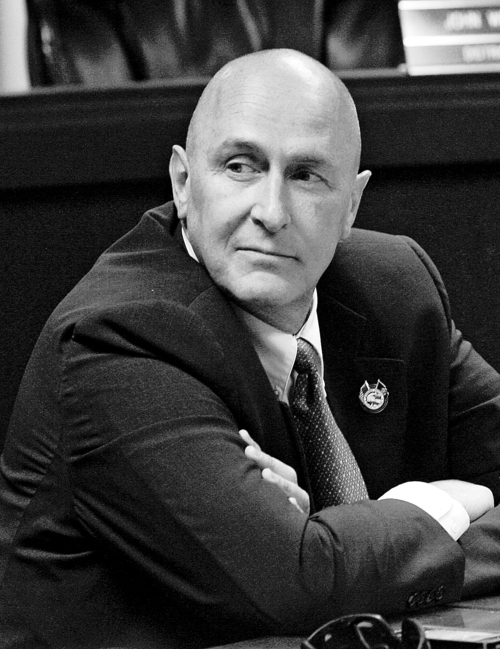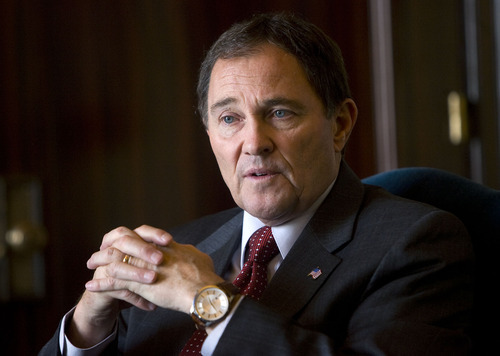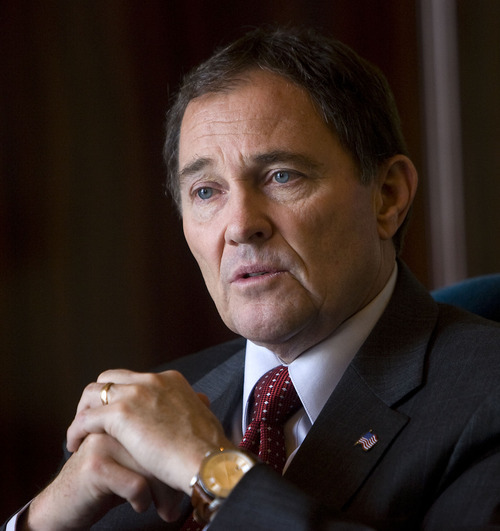This is an archived article that was published on sltrib.com in 2011, and information in the article may be outdated. It is provided only for personal research purposes and may not be reprinted.
Utah Gov. Gary Herbert on Thusday criticized the Obama administration's decision to focus immigration enforcement efforts only on those with criminal charges, saying it is an open invitation to people to break the law and enter the country.
"It's certainly de facto amnesty and I'm surprised that President Obama took the position he did and I worry that that is more about politics than principle," Herbert said during his monthly news conference at KUED.
Herbert insists that the Obama policy is different from a recent Utah law, signed by Herbert, which allows undocumented immigrants to pass a background check, pay a fine and obtain a work permit allowing them to work in the state legally.
The difference, according to Herbert, is that the state doesn't have the ability to deport people, but wants to make sure that those undocumented immigrants in the state are paying taxes and have a permit.
The Obama administration issued a directive last week, ordering a case-by-case review of several hundred thousand pending immigration cases, and instructing agencies to devote resources to individuals who have committed serious crimes or flagrant immigration violations.
It could mean that thousands of undocumented immigrants will get a reprieve, having their deportation stayed and receiving a chance to apply for a work permit.
"The president has said on numerous occasions that it makes no sense to expend our enforcement resources on low-priority cases," Homeland Security Secretary Janet Napolitano wrote in a letter to lawmakers. To not prioritize cases "hinders our public safety mission — clogging immigration court dockets and diverting DHS enforcement resources away from individuals who pose a threat to public safety."
Herbert said he understands that the government has limited resources to deal with an estimated 11.2 million undocumented immigrants in the United States, but he considers the Obama policy an open invitation to break the law.
"For practical purposes, I think the government is saying we can't round up everybody," Herbert said, "but now to make it as if it were an official policy just says to the marketplace, 'You know, we're only going to prosecute these few over here. The rest of you come on in. It's welcome time.' … I think that's the wrong message to send. That is not the right way to deal with the issue."
The governor's view is in stark contrast with comments from Attorney General Mark Shurtleff, who praised the Obama policy, saying it is in line with what Utah tried to do when it passed HB116 because the state will identify law-abiding citizens "and indicate they are people the federal government doesn't need to go after."
Shurtleff said that prosecutorial discretion is nothing new and is in the best interest of justice and that he was "dismayed" by Republicans who disagree.
"Our resources are not best used in this country … going after those who are otherwise law-abiding citizens," Shurtleff said.
"The proper role of government is to protect the public and that's what [the Obama policy] is about: How to protect the public, given limited resources."
Rep. Chris Herrod, who fought fiercely against HB116, said he disagrees with the distinction that Herbert is making between the two policies and he believes both are amnesty.
"I would agree with [Herbert] that what President Obama is doing is amnesty and I think it's dangerous because it's basically undermining the rule of law," Herrod said. "But I think [HB]116 is a form of amnesty and I don't think we have the authority to make federal law."
Herrod said Shurtleff's contention that prosecutors should be able to decide where to focus their resources is dangerous because it lets them pick and choose.
"He is setting policy because it doesn't matter what laws are on the books. He's judge, jury and king," Herrod said. "That's why we've had a disagreement with the attorney general, because for some time he's made it the state policy not to enforce [immigration] law."
Herbert defended HB116, saying Utah had to act because the federal government has been unwilling to enforce immigration law and part of the motivation for passing the guest-worker law was to get the federal government to act.
Asked whether there is a difference between the federal government's prioritization of immigration cases and the state using its discretion not to prosecute polygamy cases, Herbert acknowledged there is little difference, but "it's a matter of prioritization."
"I'm not saying it isn't hypocritical," Herbert said. "Again, it's a matter of managing the taxpayers' dollars the best you can. Whether we have the ability practically to raise enough revenue to round up people and enforce that particular law, the anti-polygamy law is questionable.
"There doesn't seem to be a big surge of people and public demand to raise taxes and spend money there," he said. "It's a matter of prioritization."







